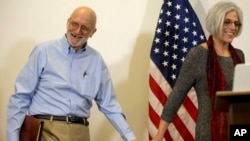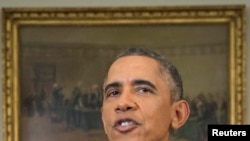After flying home from Havana on a United States government plane, a visibly weary but elated, newly freed Alan Gross thanked all those who worked tirelessly for his release from a Cuban jail Wednesday.
"Your prayers and actions have been comforting, reassuring and sustaining," Gross said during a press conference at his attorney's office in Washington.
"Today is the first day of Hanukkah, and so far it's the best Hanukkah that I’ll be celebrating for a long time," he added, marking the first day of the Jewish holiday. "What a blessing it is to be a citizen of this country."
He then expressed thanks to President Barack Obama, his wife Judy Gross, his personal attorney Scott Gilbert and members of Congress who helped to secure his release. Gross touched down on American soil at Joint Base Andrews in Maryland accompanied by his wife, his attorney, and U.S. Senators Jeff Flake (R-Arizona), Patrick Leahy (D-Vermont) and Rep. Chris Van Hollen (D-Maryland).
Now 65, Gross, a resident of Potomac, Maryland, had been arrested by Cuba on December 3, 2009. The U.S. Agency for International Development (USAID) subcontractor was later convicted and sentenced to 15 years in prison for importing banned technology and trying to establish clandestine Internet service for Cuban Jews.
Just hours after Cuba's communist leaders agreed to his release, the Obama administration announced a major shift in relations with the Caribbean island-nation, unveiling plans to restore full diplomacy and establish an embassy in Havana.
Gross, who received a telephone call from the president while flying home, told reporters he hopes both countries can get beyond the Cold War-era hostilities of the past half century.
Gross' imprisonment was just a recent dispute in a rift between the U.S. and Cuban governments that began with the1959 revolution that brought Fidel Castro to power.
Speaking after his release, Gross called the majority of Cuban nationals "incredibly kind, generous and talented."
“In no way are they responsible for the ordeal to which my family and I have been subjected,” he said. "It pains me to see them treated so unjustly as a consequence of two governments’ mutually belligerent policies.”
He also praised the sudden breakthrough in diplomatic relations between the countries.
“This is a game changer which I fully support,” he said of Obama's speech.
Declining health
Gross, who marked his fifth year in captivity on December 3, had staged a nine-day hunger strike in April. After his 65th birthday in May, Gross vowed not to turn 66 in prison, telling visitors he would rather die. He said goodbye to his wife and daughter in July and subsequently refused to see them or U.S. diplomats in Havana, his attorney told Reuters.
“I am fasting to object to mistruths, deceptions and inaction by both governments, not only regarding their shared responsibility for my arbitrary detention, but also because of the lack of any reasonable or valid effort to resolve this shameful ordeal,” Gross's lawyer said in a statement released on his behalf earlier this year.
His legal team also expressed their client's wish to meet with his cancer-stricken mother, Evelyn, before it was too late. But, she died in June at age 92.
Gross' mental and physical health had declined, he could barely walk, the vision in his right eye was greatly diminished and he had grown increasingly suicidal while losing some 100 pounds (46 kilograms), Gilbert announced earlier this year.
During Wednesday's nearly 10-minute press conference, a visibly relieved Gross stood without any physical support and was missing several front teeth, but appeared to be in good spirits.
Lengthy negotiations
Talks for Gross' release lasted for about a year, with the Vatican playing a significant role, Democratic Senator Dick Durbin of Illinois said Wednesday. During the press conference, Gross also expressed gratitude to Washington's Jewish community, along with a range of Christian and Muslim organizations nationwide that advocated his release.
In addition to the release of Gross, three Cubans were freed from a U.S. jail. As a part of the exchange, Cuban authorities also released a U.S. intelligence official who had been jailed in Cuba for two decades. U.S. officials have not named the spy, but said he was active in at least three cases involving Cuban espionage.
Portions of this report are from Reuters.






